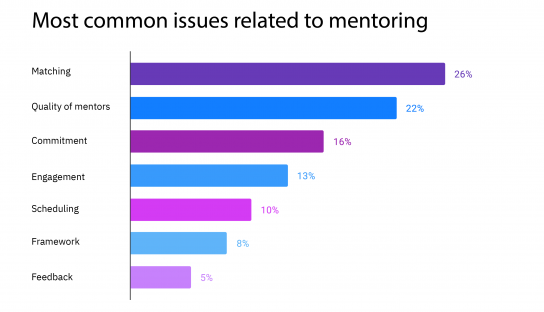This is part five from a series of insights drawn from 50 in-depth interviews taken over the past two years and 126 responses to a survey we sent out recently. To better understand our process and the methodology behind these findings, make sure to read Disciplined Accelerator: Introduction.
Most programs face issues with mentoring—from finding the right mentors, keeping them engaged, matching mentors with startups, to getting feedback and improving the mentoring program.
 Findings
Findings
- Matching mentors with startups is a tedious process for various reasons. Many startups chase famous/known mentors, who have less availability, while disregarding less popular mentors who might be more willing to give time and help. Matching mentors with startups in the beginning is not a guarantee of effective mentoring throughout the program.
- A lot of programs present an impressive mentor pool to startups, however more than 70% of the mentors fail to deliver on the initial expectations. Lack of commitment and engagement is a frequent problem and few accelerators have managed to find the right incentives. Some accelerators rely on paid mentors (whom should rather be called “consultants”), an approach that results into better retention of mentors but is hardly affordable for most programs.
- Remote mentoring sessions are harder to schedule and keep track of (mostly because of mentor commitment/engagement decreasing after the start of the program). On-site, face-to-face sessions are more effective usually, as mentor can dedicate a longer period to mentor 2-3 startup teams.
Insights
- Motivation and behavior is radically changed by including any external incentives (money, equity). Each approach needs a different mentor selection, onboarding, and managing process. “Free” mentoring often means low commitment and the solution is counter-intuitive: ask mentors for more. By getting them involved in scouting, reviewing applications, onboarding, evaluation sessions, demo days, and other activities will increase their motivation and engagement.
- Build a diverse mentor pool by including several categories: industry executives have an increasing interest in the startup world, the energy and grind being different from their regular workplace, and can be a source of great connections and customers; successful entrepreneurs and alumni who have already gone through the program and had their startups funded are happy to share their unique experiences and viewpoints; investors have an ongoing interest in your startups and will provide healthy and candid advice, while keeping them engaged might result in easier follow-on financing and support; accelerator staff might know a lot about what startups go through, especially in the early stages.
“We get some of our best coaches/mentors from BigCo execs leaving their corporate jobs and who want to get into the startup space.”
— Jackie Willmot, XLerateHealth
- Onboarding and training the mentors is often overlooked. One of our survey respondents, Accelerace (Denmark) has been referenced many times for having one of the best training programs for mentors. Introduce your mentors to all the steps in the program, the people involved, the deadlines, the schedules. Brief them in advance on the stage of each startup entering the program. Train them on how to be better teachers. Some mentors may know the business side of things but lack skills in teaching forward their knowledge. They know science, and data, and metrics but often encounter issues in dealing with the entrepreneurs at an emotional level so understanding also the different aspects in startups vs corporates (Lean Startup approach, validating experiments and assumptions, dealing with uncertainty and chaos etc.).
- Keep your mentor accountable by signing a commitment agreement when you onboard them (similar to a volunteering agreement). It might seem too much to ask busy people to do this, but if they won’t do it how can you expect them to deliver on their promises? Another thing is to separate your pool into “mentors” (the ones who are truly committed and deliver on their promises), “experts” (the ones who will help once or twice in a while, but won’t commit to get involved recurrently), and “contacts” (the ones whom might not be committed or engaged but still be a useful connection). Ask your engaged mentors to bring other people in their network as mentors, as long as they are involved in their onboarding and engagement—this way you will be able to create a strong support team for your programs. In the end, it’s nothing different than a volunteering program for successful, busy people.
Connect mentors with founders
- Easily match mentors with startups based on multiple criteria.
- Keep track of mentoring progress, feedback, and ratings.
- Both startups and mentors can schedule sessions, and more...